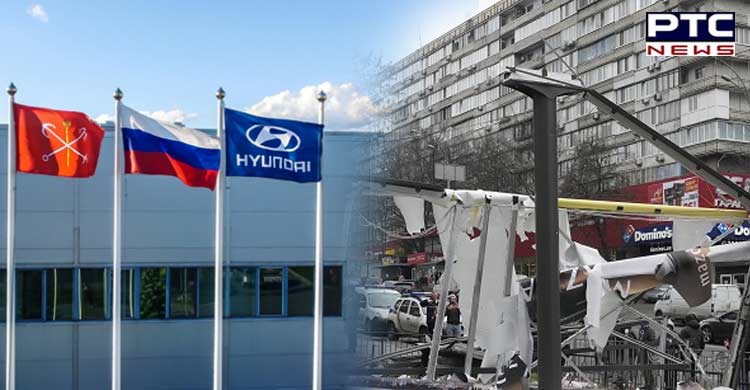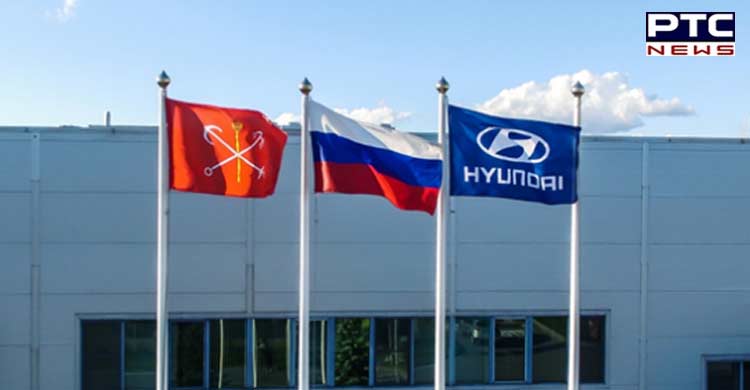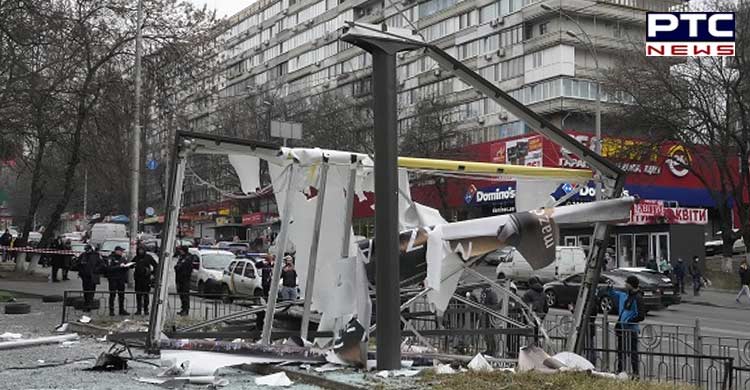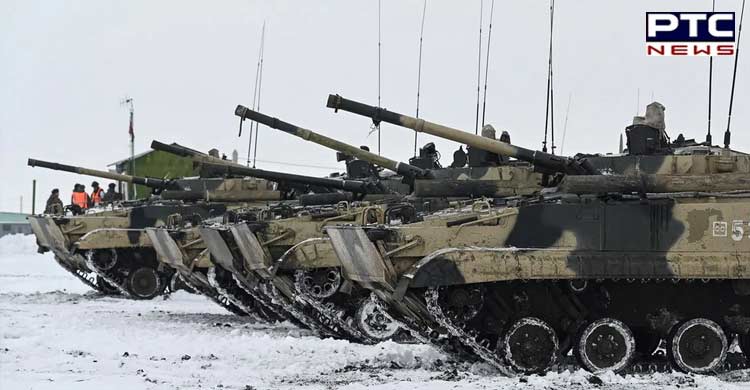

Russia-Ukraine war to severely affect Hyundai Motor Group
Seoul (South Korea), March 2: Hyundai Motor Group is likely to be severely affected by the ongoing Russia and Ukraine war, which has resulted in harsh sanctions imposed on the former because the company has the second-largest share in the Russian market.
 Particularly, the Russian market is the fourth-largest market after Korea, the U.S. and Europe for Kia Motors and the loss of Hyundai Motor and Kia is expected to touch 450 billion won.
Hyundai Motor sold 171,811 units in Russia last year, according to industry data released on March 1. With a market share of 10.3%, it ranked third. Kia came in second with 205,801 units sold, accounting for 12.3% of the market.
Even though the local brand Avtovaz Lada had the largest share i.e. 22.3%, both Hyundai and Kia have had strong sales in Russia. Hyundai Motor Group came in second place overall, behind Renault Group (Lada). Hyundai Motor Group has a market share of 22.6 percent, while Renault, Mitsubishi, Nissan and Lada have a combined market share of 33.8 percent.
Particularly, the Russian market is the fourth-largest market after Korea, the U.S. and Europe for Kia Motors and the loss of Hyundai Motor and Kia is expected to touch 450 billion won.
Hyundai Motor sold 171,811 units in Russia last year, according to industry data released on March 1. With a market share of 10.3%, it ranked third. Kia came in second with 205,801 units sold, accounting for 12.3% of the market.
Even though the local brand Avtovaz Lada had the largest share i.e. 22.3%, both Hyundai and Kia have had strong sales in Russia. Hyundai Motor Group came in second place overall, behind Renault Group (Lada). Hyundai Motor Group has a market share of 22.6 percent, while Renault, Mitsubishi, Nissan and Lada have a combined market share of 33.8 percent.
 Last year, Hyundai Motor and Kia's sales in Russia amounted to 5% and 8% of their total global sales, respectively. Kia's sales in Russia were higher than those of India (7%), China (5%), Asia-Pacific (5%), the Middle East (7%), and Latin America (3%). After Korea (19 percent), North America (27 percent), and Western Europe (19 percent), Russia is Kia's fourth-largest market.
Hyundai Motor Group has a large number of local subsidiaries in Russia, while 55 local subsidiaries are established by Korean companies in Russia, of which 18 companies were established by Hyundai Motor Group.
Also Read | Why is Russia declaring war against Ukraine? Here’s what you should know
Hyundai Motor promoted Oh Ik-Kyun, executive director of the Russian headquarters, to vice president for his contribution to increasing sales and profits in the Russian market.
The majority of Hyundai Motor Group's vehicles sold in the global market are produced in Russia.
Hyundai Motor Group's St. Petersburg plant manufactures 230,000 units per year, and in 2020, it acquired a plant from General Motors with a 100,000-unit annual manufacturing capacity. Hyundai Motor's new plant was supposed to start production in the first quarter of this year, but nothing has been confirmed.
Last year, Hyundai Motor and Kia's sales in Russia amounted to 5% and 8% of their total global sales, respectively. Kia's sales in Russia were higher than those of India (7%), China (5%), Asia-Pacific (5%), the Middle East (7%), and Latin America (3%). After Korea (19 percent), North America (27 percent), and Western Europe (19 percent), Russia is Kia's fourth-largest market.
Hyundai Motor Group has a large number of local subsidiaries in Russia, while 55 local subsidiaries are established by Korean companies in Russia, of which 18 companies were established by Hyundai Motor Group.
Also Read | Why is Russia declaring war against Ukraine? Here’s what you should know
Hyundai Motor promoted Oh Ik-Kyun, executive director of the Russian headquarters, to vice president for his contribution to increasing sales and profits in the Russian market.
The majority of Hyundai Motor Group's vehicles sold in the global market are produced in Russia.
Hyundai Motor Group's St. Petersburg plant manufactures 230,000 units per year, and in 2020, it acquired a plant from General Motors with a 100,000-unit annual manufacturing capacity. Hyundai Motor's new plant was supposed to start production in the first quarter of this year, but nothing has been confirmed.
 Despite efforts to grow production in Russia, due to Russia's invasion of Ukraine, it is projected to be difficult to earn predicted revenues. Furthermore, the Russian auto market's sales volume initially reached 2.5 million to 2.7 million units between 2013 and 2014 but decreased to 1.5 million units in 2020 as the price of raw materials, Russia's key export item fell.
Hyundai Motor Group also plans to sell 455,000 units in Russia this year, up 5.8% from last year. It has, however, become uncertain as a result of Russia's invasion.
Furthermore, due to international economic sanctions against Russia, annual car sales in the country are likely to remain at 1.6 million units.
Also Read | Russia-Ukraine war: Indian embassy advises its citizens to leave Kiev urgently
On the 28th, the ruble plummeted to 119 rubles per dollar as Western countries excluded major Russian banks' SWIFT codes. This is a 28.77 percent drop from the previous day, the lowest level ever. In response to the sanctions, Russia's central bank increased the base rate from 9.5 to 20%.
However, as the ruble falls in value, it is projected that purchasing power will continue to fall.
Companies in Korea, notably Hyundai Motor Group, may face currency losses as a result of the significant decrease in the ruble. Locally manufactured and sold goods may be less affected, but export items are predicted to be severely impacted, even if other currencies are used to reduce risk.
Despite efforts to grow production in Russia, due to Russia's invasion of Ukraine, it is projected to be difficult to earn predicted revenues. Furthermore, the Russian auto market's sales volume initially reached 2.5 million to 2.7 million units between 2013 and 2014 but decreased to 1.5 million units in 2020 as the price of raw materials, Russia's key export item fell.
Hyundai Motor Group also plans to sell 455,000 units in Russia this year, up 5.8% from last year. It has, however, become uncertain as a result of Russia's invasion.
Furthermore, due to international economic sanctions against Russia, annual car sales in the country are likely to remain at 1.6 million units.
Also Read | Russia-Ukraine war: Indian embassy advises its citizens to leave Kiev urgently
On the 28th, the ruble plummeted to 119 rubles per dollar as Western countries excluded major Russian banks' SWIFT codes. This is a 28.77 percent drop from the previous day, the lowest level ever. In response to the sanctions, Russia's central bank increased the base rate from 9.5 to 20%.
However, as the ruble falls in value, it is projected that purchasing power will continue to fall.
Companies in Korea, notably Hyundai Motor Group, may face currency losses as a result of the significant decrease in the ruble. Locally manufactured and sold goods may be less affected, but export items are predicted to be severely impacted, even if other currencies are used to reduce risk.
 Hyundai Motor and Kia are expected to lose 450 billion won, according to industry estimates.
"Hyundai Motor's maximum sales decline is expected to be about 200 billion won, 4 per cent compared to last year's net profit, and Kia's maximum sales decline will be 250 billion won, 5 per cent of last year's net profit," said Lim Eun-young, the manager of Samsung Securities' EV and Mobility team.
"However, due to the decreased global automobile production, it is possible to transfer export volume to other regions. As US companies such as GM and Ford have withdrawn from Russia, the competition is currently not that strong."
Also Read | Hope, fear and fairy tales — current atmosphere of makeshift shelters
-PTC News
Hyundai Motor and Kia are expected to lose 450 billion won, according to industry estimates.
"Hyundai Motor's maximum sales decline is expected to be about 200 billion won, 4 per cent compared to last year's net profit, and Kia's maximum sales decline will be 250 billion won, 5 per cent of last year's net profit," said Lim Eun-young, the manager of Samsung Securities' EV and Mobility team.
"However, due to the decreased global automobile production, it is possible to transfer export volume to other regions. As US companies such as GM and Ford have withdrawn from Russia, the competition is currently not that strong."
Also Read | Hope, fear and fairy tales — current atmosphere of makeshift shelters
-PTC News
